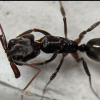Ants from different colonies will almost always immediately attack and kill each other as soon as they come into contact, however eggs, larvae and even pupae from foreign nests or even different species can be seemlessly integrated into a colony and have no aggression from either side. Larvae have to be somewhat aware as they move around, eat, spin cocoons, perfrom trophallaxis etc. so why are they immediately integrated into a nest, even in highly predatory ants. Why are foreign brood not simply viewed as food? Especially brood of a different species. I can understand how parasitic species or some other specially adapted species would be able to readily accept foreign brood as they would be kind of "designed" for it. but it seems strange that many normal ants will readily accept another colony's brood
- Formiculture.com
- Forums
- Gallery
- Members
- Member Map
- Chat













